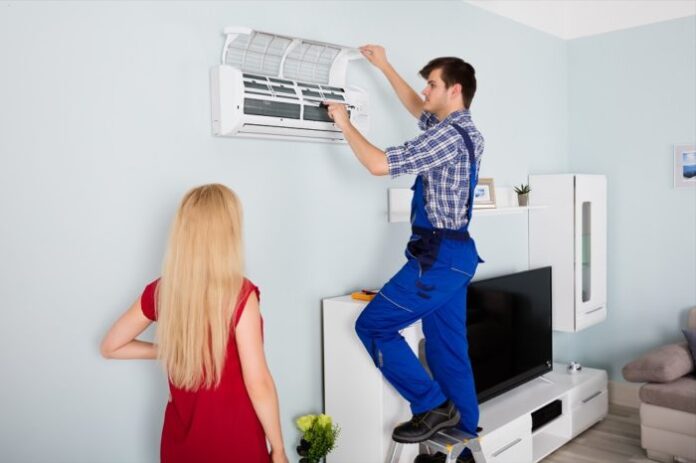Summers around the world keep getting hotter, hitting many where it hurts: Right in the air conditioning bill. Fortunately, homeowners can use a few tips to run their air conditioners more safely and more efficiently. With the following simple adjustments to your AC unit, you can save money and cut down on the risk of allergies and asthma problems.
1. Clean or Change Your AC Filter

A central air conditioner’s filter needs to be changed every three months. If your unit is continuously running, you may need to change it monthly. The exception to this rule is a “split” or ductless air conditioner that has a removable panel; you can access the filter through the panel to wipe it clean.
Replacement filters are relatively inexpensive at around $10 or less. A clogged filter can increase your AC bill by 5% to 15%, not to mention shortening the lifespan of your AC unit. Dirty filters prevent air from flowing freely through the unit, which in turn could lead to your evaporator coil freezing. Save yourself the hassle and buy the new filter.
2. Have Your AC Unit Serviced Every Year

According Action AC, an air conditioning unit that isn’t maintained is less efficient which makes it run more often and will increase your electricity bill. If your unit is working at top efficiency it will need to run less often. When it comes to annual inspection and service on your air conditioner, you have two options. One is to watch online tutorial videos and figure out how to do it yourself. The other is to call an air conditioning service to do it for you, such as Colair Inc.. If you need tips on finding a professional AC contractor, check with the U.S. Department of Energy.
3. Install a Programmable Thermostat
You could remember to adjust the thermostat each time you get out of bed, leave home, return home and go to bed at night, or you could program a thermostat to remember all those adjustments for you. Smart thermostats can even be adjusted from your phone if you buy one that comes with an app. Some smart thermostats allow you to change the settings for individual rooms which lead directly into our next tip.
4. Only Cool the Rooms You Use

If you do not have direct control of each individual room via an advanced thermostat then closing the AC vents in rooms you don’t use is a nice workaround. A guest bedroom without any guests doesn’t need to be the same comfortable temperature as your living space. Close closet doors to avoid losing cold air to unoccupied closet space.
5. Correctly Position Your Thermostat and Vents

Make sure your thermostat is out of direct sunlight and away from any lamps that give off heat. A poorly placed thermostat could read the room as hotter than it is, causing the AC to work overtime.
Also make sure that your vents are unobstructed, which includes the intake vents. Otherwise, the air conditioning unit will have to work harder to get the temperature around the thermostat to the desired temperature. It is vital to keep curtains and furniture away from your AC vents to allow for maximum airflow.
6. Turn the Thermostat Up

This seems to be an obvious tip but most people aren’t aware how much you can actually save by setting your thermostat up only a few degrees. For every degree you raise the temperature on your thermostat, you’ll save about 3% on the cost of your AC bill. Which means you could potentially save around 10% by turning up the temperature by only 3 degrees. If you allow your body to adjust to a slightly higher temperature than what you’re comfortable with now, you’ll see the effect on your budget as well as doing something good for the environment.
7. Use Blinds and Curtains

Natural lighting is wonderful but it also hot. The sunlight streaming through your windows raises the temperature in your rooms making your AC run more often and raising your electricity bill. Block the sun by installing and using blinds and curtains to lessen the load on your AC. Some window blinds can actually raise the R-value of the windows helping to keep radiant heat outside as well.
8. Use Ceiling Fans

Ceiling fans help to circulate cooled air throughout your living space, reducing the burden on your AC unit. Good air circulation will allow you to remain comfortable throughout the house at higher thermostat settings because you won’t have the “hot spots” in your home. In the summer, ceiling fans should be turned counterclockwise to maximize airflow. For a great selection on ceiling fans, visit https://www.crompton.co.in/ceiling-fans/.
9. Consider a Whole House Fan

Instead of cooling hot air a whole house fan can remove it completely replacing it with cool air from the outside. Installation is relatively painless and can pay for itself within a couple of summers. Without a whole house fan, the heat of the day gets trapped inside your home and your AC has to convert this heat through its condensers, costing you money. A whole house fan can even eliminate the need to run the air conditioning unit at night, the savings could be immense.
10. Check Windows and Doors for Drafts

Most utility companies offer a free service to homeowners where they come out and give you an energy efficiency assessment. Take advantage of this free offer if it is available in your area. Not only will they check for escaping air in your windows and doors but they will make sure you have the most energy-efficient light bulbs. You can lower more than your cooling cost for basically no cost and no obligation. Most fixes can be performed for very little cost and very little effort, such as replacing weather stripping around doors.
Conclusions
Lowering your energy usage will not only save you money but if everybody does it will reduce the load on the entire power grid along with any environmental issues that come along with it. You don’t have to be an environmentalist to benefit from helping the environment, lower energy usage equals lower energy bills.









